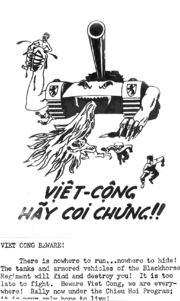
Chieu hoi bag
Encyclopedia

Defection
In politics, a defector is a person who gives up allegiance to one state or political entity in exchange for allegiance to another. More broadly, it involves abandoning a person, cause or doctrine to whom or to which one is bound by some tie, as of allegiance or duty.This term is also applied,...
by the
Viet Cong and their supporters to the side of the Government during the Vietnam War
Vietnam War
The Vietnam War was a Cold War-era military conflict that occurred in Vietnam, Laos, and Cambodia from 1 November 1955 to the fall of Saigon on 30 April 1975. This war followed the First Indochina War and was fought between North Vietnam, supported by its communist allies, and the government of...
.
Campaign
Defection was urged by means of a propagandaPropaganda
Propaganda is a form of communication that is aimed at influencing the attitude of a community toward some cause or position so as to benefit oneself or one's group....
campaign, usually leaflets delivered by artillery shell or dropped over enemy-controlled areas by aircraft, or messages broadcast over areas of South Vietnam. A number of incentives were offered to those who chose to cooperate, along with psychological warfare
Psychological warfare
Psychological warfare , or the basic aspects of modern psychological operations , have been known by many other names or terms, including Psy Ops, Political Warfare, “Hearts and Minds,” and Propaganda...
to break enemy morale.

By 1967 approximately 75,000 defections had been recorded, but analysts speculate that less than 25% of those were genuine. The program had some difficulty catching on, due in part to the culture gap
Culture gap
A culture gap is any systematic difference between two cultures which hinders mutual understanding or relations. Such differences include the values, behavior, education, and customs of the respective cultures...
—such as misspellings and unintentionally offensive statements—and worsened by communist reprisals against defectors and their families. To make matters worse, as testified by Sergeant Scott Camil
Scott Camil
Scott Camil is a noted political activist. He first gained prominence as an opponent of the Vietnam War, as a witness in the Winter Soldier Investigation and a member of Vietnam Veterans Against the War....
during the 1971 Winter Soldier Investigation
Winter Soldier Investigation
The "Winter Soldier Investigation" was a media event sponsored by the Vietnam Veterans Against the War from January 31, 1971 – February 2, 1971. It was intended to publicize war crimes and atrocities by the United States Armed Forces and their allies in the Vietnam War...
, the passes were sometimes ignored by U.S. forces, and their holders shot while surrendering.
Overall, however, the Chieu Hoi program was considered to be successful. Those who surrendered were known as "Hoi Chanh", and were often integrated into allied units as Kit Carson Scouts
Kit Carson Scouts
The Kit Carson Scouts belonged to a special program initially created by the U.S...
, operating in the same area where they had been captured. Many made great contributions to the effectiveness of U.S. units, and often distinguished themselves, earning decorations as high as the Silver Star
Silver Star
The Silver Star is the third-highest combat military decoration that can be awarded to a member of any branch of the United States armed forces for valor in the face of the enemy....
. The program was relatively inexpensive, and removed over 100,000 combatants from the field.

